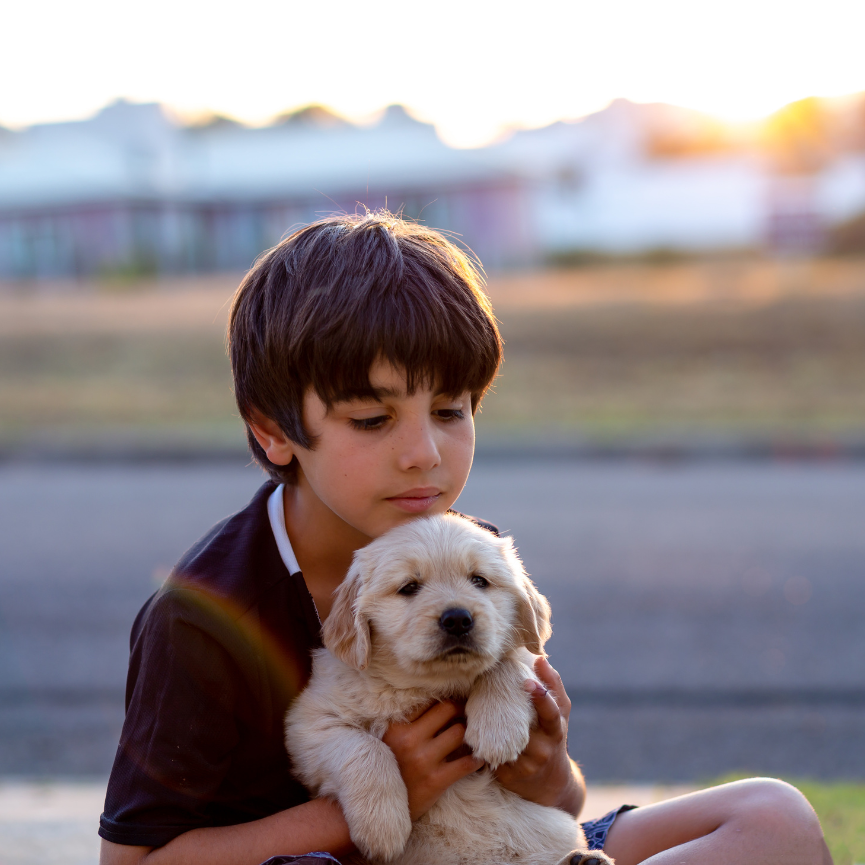
- May 10, 2024
- 12 Views
- 0 Comments
The Impact Of Animal-Assisted Therapy In Autism
The Power of Paws: Discovering the Hidden Benefits of Animal-Assisted Therapy for Children with Autism
Taking care of pets can make children with autism happier. The smiles of pure joy on the faces of our Autistic children are worth a million sleepless nights. Also, keeping dogs at home can significantly improve our children's quality of life. Children with Autism Spectrum Disorder have been shown to develop their social skills more when receiving animal-assisted therapy (AAT). Researchers hypothesize that certain animals are ideally suited to serve as "emotional bridges" in therapeutic environments because they are quick to respond lovingly to attention.
Although the present pandemic has made all families more stressed, parents of autistic children report higher levels of stress.
Your small-pawed companions, fuzzy felines, chubby guinea pigs, or silvery swimming fishes can be a wonderful help in such a situation.
According to studies, having a pet helps children with autism and their parents form close ties and reduce stress.
Anxiety and communication difficulties are a couple of the main difficulties that kids with autism confront. Pets not only benefit autistic children and their parents by increasing social engagement and reducing anxiety, but they may also be a source of solace and support for their parents.
More than 700 families from the Interactive Autism Network were polled by Gretchen Carlisle, a research scientist at the Research Center for Human-Animal Interaction in the MU College of Veterinary Medicine, about the advantages and drawbacks of owning a dog or cat.
How families with autistic members can benefit from the human-animal link
She discovered that despite the responsibility of pet care, both parents and children with autism reported having close relationships with their animals.
According to research, children on the autism spectrum and their families can benefit greatly from the human-animal link in terms of their health.
There is scientific data supporting the beneficial effects of human-animal connection on kids with autism spectrum condition, whether it be a trained service dog or a guinea pig (ASD).
Children with autism usually struggle to focus, react to sensory input, and interact with others.
Pet therapy, according to research, can be particularly useful in addressing these problems. When scientists discovered that autistic kids tended to prefer animal photos to human ones and that they also seemed to be less receptive to human voices than other sounds, they were fascinated. According to recent studies, introducing a dog to children with autism decreased tension, anxiety, and irritability while also creating a more tranquil environment for everyone.
Advantages of pets for autistic children
Facilitates the formation of connections:
The inability to connect and socialize with others is one of the traits of children on the autism spectrum that is most frequently present, and as a result, many ASD children experience social isolation and loneliness.
Children with autism may experience less loneliness and more required companionship as a result of their relationship with a companion animal.
It's common to attribute this link to pets' inherent nonjudgmental and unconditional love.
Strengthens social connections:
Pets can help children with ASD make new social connections because they frequently lower obstacles to starting new conversations and social interactions.
Pets have also been shown to improve socialization in children with autism in educational settings and other institutions, resulting in greater classroom involvement.
Enhances both spoken and nonverbal communication:
In one study, it was discovered that when a therapy dog was brought into a therapeutic setting, severely reclusive children with ASD displayed a substantial increase in verbal and nonverbal communication, aimed both at the therapy dog and the therapist.
Children who interacted with a therapy dog demonstrated lower feelings of isolation and general depressive symptoms, in addition to greater sociability, according to research on the use of therapy dogs in social skills interventions for children with high-functioning autism.
Improving family relationships and reducing stress:
Families of children with autism have been shown to benefit from having companion animals in the house. According to a study on the effects of having a pet dog on families with an autistic child, having a dog significantly reduced long-term family conflict and parental stress.
Reduces anxiety in parents:
Having a dog may also help with parenting stress related to problematic parent-child interactions.
Families can gain from service dogs that have been trained to help children with autism in a variety of ways.
Having pets fosters compassion:
Children with autism learn compassion through pets. Taking care of a pet on a daily basis teaches all kids to be compassionate to others.
Aids socialization of autistic children:
A pet might act as a connection point for a child who feels uncomfortable around other kids. A nice dog attracts most kids, and an autistic youngster will be easier to approach if they have a pet with them.
Unconditional affection:
Children with autism feel more confident when they have pets. Pets are unconditional in their affection and attachment and do not pass judgment. Hence, the pet won't notice if an autistic child has quirks that other kids find bothersome.
The animal will still adore the kid. And after a long day at school, that may be a very useful and restful setting to return to.
Autism can be helped by many pets.
There are other kinds of animals, besides dogs, that can help people with autism.
In a study examining the interactions between autistic children and guinea pigs, it was discovered that the guinea pig's presence increased the frequency of social contact with acquaintances and that the children displayed some social behavior traits that they did not display in the absence of the therapeutic animal.
Researchers came to the conclusion that "guinea pig therapists" are beneficial not only because of their small size but also because of their docile nature and their capacity to be dependable members of the child's family.
In addition, it has been discovered that equine-assisted treatment improves social and communication skills as well as reduces hyperactivity and irritability in kids with ASD.
How to select a pet for kids with special needs
It is advised that parents who are thinking about getting a pet for their family involve the child in the decision-making process and make sure the pet's level of activity matches the child's.
Every child is unique, so picking a pet for a child with autism is an essential choice for the entire family.
Hence, although a dog might be the perfect pet for one family, a cat or bird might be a better choice.
A huge, loud, and active dog might cause sensory overload for a particular child with autism due to specific sensitivities, whereas a calm cat may be a better choice.


Comments - 0 comments till now